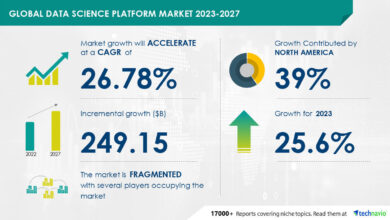Beyond FOMO — Keeping Up-to-Date in AI | by Carsten Frommhold | Jun, 2024

I took my first steps in mathematical modeling about 9 years ago when I was still a student. After finishing my bachelor’s degree in mathematics that was very theory heavy, for master studies I chose some courses that involved mathematical modeling and optimization of economic issues. My favorite topic at that time was time-series. It was relatively relaxed to get an overview of different modeling approaches. Proven methods had been in place for over a decade and had not changed rapidly.
Similar conditions existed until a few years ago when entering the world of data science. The fundamental techniques and models were relatively quick to learn. In implementation, a lot was solved from scratch, own networks were coded and worked. New tools & technologies were welcomed and tried out.
Today, the feeling is different. Now, when one takes a look at the X or LinkedIn feeds, one almost weekly receives news about important tools and developments.
Since the hype about LLMs with the release of ChatGPT in November 2022, it has become extreme. The race is on between open source and closed source. Google followed with Gemini, Meta released LLama, and Stanford University introduced Alpaca. Applications are operationalized using tools like Langchain, and a whole range of tools for standardizing applications are emerging. Tuning mechanisms are continually improved. And then there was also the release of xgboost 2.
The wheel seems to be turning at an ever-faster speed. In recent years, this is largely due to methodological breakthroughs in GenAI and the ever-growing toolbox in the MLOps area.
And it’s important to follow: What’s happening in the market? Especially when you work in this industry as a consultant. Our clients want to know: What’s the hot, new stuff? How can we use it profitably?
Today, it is essential to keep the ball rolling! Those who don’t will lose touch very fast.
Is that the case?
The last time I attended a big conference, I lay awake for two nights, barely able to sleep. It wasn’t just due to the nervousness before a talk, but also because of the massive amount of information that was hurled at me in such a short time.
Conferences are fantastic. I like meeting new people, learning about different approaches, and exchanging ideas and problems that might be completely new to me. Yet, I found no sleep those nights. The I’ll need to check this later in more depth-list seems impossible to tackle. FOMO (fear of missing out) kicks in. Thoughts occur like “isn’t it already too late to jump on the train for GenAI?” At that moment, I overlooked the fact that I was part of the bias, too. My presentation was about a use case we implemented with a client. Two years of work compressed into thirty minutes. Did the audience take away valuable impulses and food for thought as intended? Or did the contribution also subtly cause FOMO?
Another phenomenon that keeps reappearing is the imposter syndrome [1]. It describes the emerge of strong doubts about one’s own abilities, coupled with the fear of being exposed as a “fraud.” People who suffer from imposter syndrome often feel as though they are not capable or qualified for the positions or tasks they hold. This can also arise through comparisons with others, leading to a momentary self-perception: “I can’t actually do anything good.”
From honest exchanges with people from my work environment, I know that this crops up from time to time for many. I have talked to people who I would attribute a very high level of experience and expertise. Almost all of them knew this feeling.
The variability of technologies and the rapid progress in the field of AI can additionally trigger this.
What is the core element of data science? It’s about a functioning system that creates added value. If you’re not a researcher but a data scientist in business, the focus is on application. A model or heuristic learns a logic that a human being cannot learn in such detail and/or apply on such a scale. It doesn’t have to be an end-to-end, fully automated solution.
One should start with the development of a system that works and is accepted by the stakeholders. Once trust in the system is established, one can look at what can be further improved.
Is it the methodology? Perhaps there’s an algorithm in use that could be replaced by a deep-learning architecture capable of representing more correlations in the variables.
Is it the runtime? Can the runtime be reduced by other frameworks or with the help of parallelization? Then the path is clear to engage with this topic.
Perhaps it is also the systematic capture & management of data quality. Data validation tools can help detect data imbalances early, identify drifts, and monitor the output of an ML system.
It is valid to cautiously approach new techniques step-by-step and continuously improve an existing system.
Truth to be told, it takes time to learn new methods and technologies. There are many options for a quick overview: tl;dr summaries, overview repositories, YouTube channels etc. However, I also quickly forget the topics if I don’t spend more time on them. Therefore, to familiarize myself with a specific topic or technology, I have no choice but to occasionally block out an evening or a Saturday to delve into it.
The fact that personal knowledge acquisition takes time also directly reveals the limitation that everyone has.
Another aspect is that one cannot force experience. The ability to adopt new technologies also increases with the amount of experience one has already gained. The same applies to the ability to assess technologies and tools. The greater one’s own wealth of experience, the easier it becomes. But this requires having first developed a deeper understanding of other technologies, which can only be achieved through hands-on experience.
Don’t be afraid to ask questions. Trying things out on a higher level isn’t wrong. But sometimes it’s also worth actively seeking out experiences. Maybe there’s already someone in your company or network who has already worked with technology xy? Why don’t go for a joint topic lunch? The basic prerequisite for this: being in an environment where you can ask questions (!).
Additionally, stay engaged. As described above: The best way to retain things is by doing them. However, this doesn’t mean that it isn’t worth keeping a systematic eye out left and right and staying informed about news that doesn’t fall within the (current) scope of work. There are many great newsletters out there. A very good one is The Batch by DeepLearning.AI [2].
I work in a team of six data scientists. The same observations mentioned earlier apply here: Even within this relatively small group, one can be susceptible to impostor syndrome. After all, there is always someone who has more experience or has at least gained some experience in a particular topic, methodology, or tool.
In our team, we meet bi-weekly for a Community of Practice. We established two policies:
1. We always start at a high level to ensure that all members are on board and do not assume that everyone is already deep into the subject. We can then delve deeper.
2. It is highly encouraged to collectively explore a topic in which no one has yet developed extensive expertise.
In the last session, we addressed the topic of fine-tuning LLMs versus few-shot learning and prompting. We explored and experimented with various fine-tuning methods together. More importantly, we had a series of valuable insights into business issues, determining which mechanisms might be more effective. We left the meeting with many good ideas and further research tasks. This is far more valuable than in-depth knowledge of every detail.



